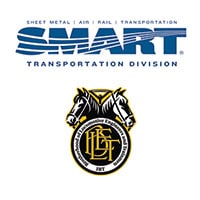
CLEVELAND, Ohio (May 27, 2020) — The Federal Railroad Administration (FRA) extended safety waivers granted to the Association of American Railroads (AAR) and the American Short Line and Regional Railroad Association (ASLRRA) in the early stages of the coronavirus pandemic recently, again favoring the material concerns of the carriers over the safety of America’s rail workers and of the general public.
The extension runs until the earlier of when the emergency declaration is lifted, or 60 days from letters dated May 21 to the AAR and ASLRRA by the agency governing safety on America’s railroads. The broad waivers concerning numerous safety regulations and training requirements were initially set to expire beginning May 24, 29 and June 9.
The leaders of two of America’s largest rail unions, the SMART Transportation Division (SMART-TD) and the Brotherhood of Locomotive Engineers and Trainmen (BLET), objected to the lengthening of these waivers that they had described as “alarming” when first initiated.
“The agency continues a pattern of FRA appeasement to the carriers,” said SMART-TD President Jeremy R. Ferguson and BLET President Dennis R. Pierce. “Essential safety tasks once again are being deferred with regulators’ blessings while the agency could not be bothered to enact an emergency order to hold carriers accountable to Centers for Disease Control and Prevention minimum health and safety standards for employees during the COVID-19 pandemic.”
The waiver extension, granted nine days after the AAR’s petition to renew, cover regulations governing:
- Periodic track inspections
- Training
- Quick tie-ups
- Locomotive and conductor certification
- Territorial qualifications
Conversely, SMART-TD and the BLET jointly petitioned FRA to respond to the pandemic multiple times in March seeking emergency orders to improve working conditions and to better protect workers from potential infection by requiring carriers to adhere to basic CDC protocols. The agency, however, declined to put its full regulatory power on the side of protecting essential transportation workers.
“The continued pattern of rubber-stamping requests by carriers while unabashedly coming up short for the essential workers who have continued to show up and work through the pandemic shows where FRA’s priorities are,” the union presidents said.
###
The SMART Transportation Division is comprised of approximately 125,000 active and retired members of the former United Transportation Union, who work in a variety of crafts in the transportation industry.
The Brotherhood of Locomotive Engineers and Trainmen represents nearly 58,000 professional locomotive engineers and trainmen throughout the United States. The BLET is the founding member of the Rail Conference, International Brotherhood of Teamsters.
Related News
- Operation Lifesaver campaigns to promote rail safety in 11 states
- New TD Crew Room Flyers Available
- Colorado bill criminalizing transit assault one step closer to becoming law
- Honoring the Legacy of Brother John A. Saunders
- Kansas funds passenger rail expansion
- Maryland Passes Monumental Transit Safety Bill
- Brother Wirth Crowned Champion in 168-Pound Masters Division Victory
- Chairman Pauli Announces Retirement, SMART-TD celebrates his career
- New Mexico Local 1687 sets new precedent with Red Apple Transit
- Tentative Agreement Reached With TransitAmerica Services (TASI)